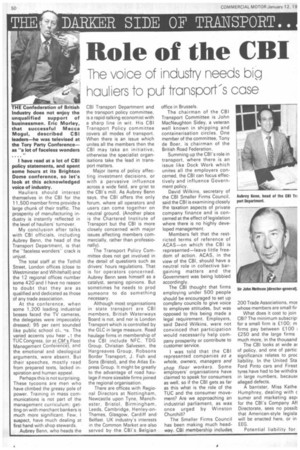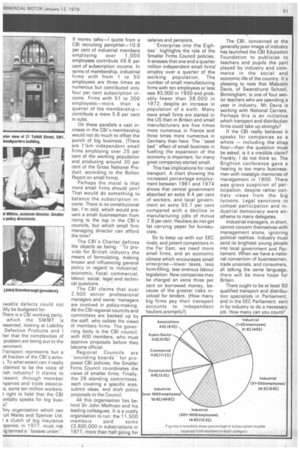Role of the CBI
Page 52

Page 53

If you've noticed an error in this article please click here to report it so we can fix it.
The voice of no ustry neec sbg hculiers to out trc nsoor s cc se
I have read at a lot of CBI policy statements, and spent some hours at its Brighton Dome conference, so let's look at this acknowledged voice of industry.
Hauliers should interest themselves in the CBI for the 11,500 member firms provide a large chunk of their traffic. The prosperity of manufacturing industry is instantly reflected in the level of hauliers' turnover.
My conclusion after talks with CBI officials. including Aubrey Berm, the head of the Transport Department, is that the "faceless wonders" crack is unjust.
The total staff at the Tothill Street, London offices (close to Westminster and Whitehall) and the 12 regional offices number some 420 and I have no reason to doubt that they are as qualified and dedicated as those of any trade association.
At the conference, when some 1,200 leading industrial bosses faced the TV cameras, the delegates were impeccably dressed; 95 per cent sounded like public school ci.ns. The varied accents you hear t the TUC Congress, (or at CM's Fleet Management Conference), and the emotional and ideological arguments, were absent. But their speeches, mostly read from prepared texts, lacked inspiration and human appeal.
Perhaps this is not surprising. These tycoons are men who have climbed the greasy pole of power. Training in mass communications is not part of the management curriculum; getting on with merchant bankers is much more significant Few, I suspect, have much dealing at first hand with shop stewards.
Aubrey Berm, who heads the CBI Transport Department and the transport policy committee, is a rapid-talking economist with a sharp line in wit. His CBI Transport Policy committee covers all modes of transport. When there is an issue which unites all the members then the CBI may take an initiative, otherwise the specialist organisations take the lead in transport matters.
Major items of policy affecting investment decisions, or with a pervasive influence across a wide field, are grist to the CBI's mill. As Aubrey Benn says, the CBI offers the only forum, where all operators and users can come together on neutral ground. (Another place is the Chartered Institute of Transport but the CBI is more closely concerned with major issues affecting members commercially, rather than professionally).
The Transport Policy Committee does not get involved in the detail of questions such as drivers' hours regulations. That is for operators concerned. Aubrey Berm sees himself as a catalyst, sensing opinions. But sometimes he needs to prod someone to do something necessary.
Although most organisations in state transport are CBI members, British Waterways Board is not, and nor is London Transport which is controlled by the GLC in large measure. Road haulage firms in membership of the CBI include NFC, TDG Group, Christian Salvesen, the Hargreaves Group, Robsons Border Transport, J. Fish and Sons (Bristol), and the Atlas Express Group. It might be greatly to the advantage of road haulage if more sizeable firms joined the regional organisation.
There are offices with Regional Directors at Nottingham, Newcastle upon Tyne, Manchester, Bristol, Birmingham, Leeds, Cambridge, Henley-onThames, Glasgow, Cardiff and Belfast. UK industry's interests in the Common Market are also served by the CBI's Belgian office in Brussels.
The chairman of the CBI Transport Committee is John MacNaughton Sidey, a veteran well known in shipping and containerisation circles. One member of the committee, Tony de Boer, is chairman of the British Road Federation.
Summing up the CBI's role in transport, where there is an issue like Dock Work which unites all the employers concerned, the CBI can focus effectively and influence Government policy.
David Wilkins, secretary of the CBI Smaller Firms Council, said the CBI is examining closely the taxation aspects of private company finance and is con cerned at the effect of legislation where there is no highly developed management.
Members felt that the restricted terms of reference of ACAS—on which the CBI is represented—leave little freedom of action. ACAS, in the view of the CBI, should have a neutral role in collective bargaining matters and the Government was being lobbied accordingly.
The CBI thought that firms employing under 500 people should be encouraged to set up compbny councils to give voice to employee attitudes, but was opposed to this being made a legal requirement. Employers, said David Wilkins, were not convinced that participation would necessarily help company prosperity or contribute to customer service.
I was told that the CBI represented companies as a whole, owners, managers and shop floor workers. Some employers' organisations have claimed to speak for consumers as well, so if the CBI gets as far as this what is the role of the TUC and the consumer movement? Are we approaching an industrial parliament, as was once urged by Winston Churchill?
The Smaller Firms Council has been making much headway. CBI membership includes
200 Trade Associations, MOE whose members are small fir What does it cost to join CBI? The minimum subscrip. for a small firm is £100; m firms pay between £100 ; £250 and the large firms much more, in the thousand
The CBI looks at wide ar of policy, and one of partic significance relates to proc liability. In the United Sta Ford Pinto cars and Firest tyres have had to be withdra in large numbers, becausf alleged defects.
A barrister. Miss Kathe Humphrey, dealing with c sumer and marketing aspi for the CBI's Company Afl Directorate, sees no possib that American-style legisla will be enacted here, or in EEG.
Potential liability for )wable defects could not dily be budgeted for.
rhere is a CBI working party, which the SM MT is resented, looking at Liability Defective Products and I her that the complexities of problem are being put to the iernment.
fransport represents but a 31I fraction of the CBI's activ3. To what extent can it really claimed to be the voice of tish industry? It claims to resent, through member npanies and trade associais, some ten million workers. t right to hold that the CBI entially speaks for big busis?
%ny organisation which can -uit Marks and Spencer Ltd, 1 a clutch of big insurance loonies, in 1977, must risk lg termed a "bosses union".
If money talks—I quote from a CBI recruiting pamphlet-10.8 per cent of industrial members employing over 1,000 employees contribute 49.8 per cent of subscription income. In terms of membership, industrial firms with from 1 to 50 employees are three times as numerous but contributed only four per cent subscription income. Firms with 51 to 200 employees—more than a quarter of the membership— contribute a mere 5.8 per cent in subs.
On these parallels a vast increase in the CBI's membership would not do much to offset the punch of big business. (There are 11/4m independent small firms employing over 25 per cent of the working population and producing around 20 per cent of the Gross National Product, according to the Bolton Report on small firms).
Perhaps the moral is that more small firms should join? That would do something to balance the subscription income. There is no constitutional bar, I'm told, which would prevent a small businessman from rising to the top in the CBI's councils, but which small firm managing director can afford the time?
The CBI's Charter defines the objects as being: -To provide for British industry the means of formulating, making known and influencing general policy in regard to industrial, economic, fiscal, commercial, labour, social, legal and technical questions . . . . "
The CBI claims that over 2,500 senior professional managers and owne: managers are involved in policy-making. All the CBI regional councils and committees are backed up by the staff, who collate the views of members firms. The governing body is the CBI council, with 400 members, who must approve proposals before they become official.
Regional Councils are ''sounding boardsfor proposed CBI policies; the Smaller Firms Council co-ordinates the views of smaller firms, Finally, the 29 standing committees, each covering a specific area, submit ideas, and draft policy proposals to the Council.
All this organisation lies behind Sir John Methven and his leading colleagues. It is a costly organisation to run: the 11,500 members paid some £3,600,000 in subscriptions in 1977, more than half going for salaries and pensions.
"Enterprise into the Eighties" highlights the role of the Smaller Firms Council policies. It stresses that one and a quarter million independent small firms' employ over a quarter of the working population. The number of small manufacturing firms with ten employees or less was 93,000 in 1930 and probably fewer than 38,000 in 1972, despite an increase in population of a sixth. Many more small firms are started in the US than in Britain and small manufacturers are five times more numerous in France and three times more numerous in Germany than here. The "seed bed" effect of small business in fuelling the expansion of the economy is important, for many great companies started small.
This has implications for road transport. A chart showing the increased percentage employment between 1961 and 1974 shows that central government absorbed an extra 9.4 per cent of workers, and local government an extra 53.7 per cent compared with a decline in manufacturing jobs of minus 7.8 per cent. Hauliers do not get fat carrying paper for bureaucrats.
So to keep up with our EEC rivals, and potent competitors in the Far East, we need more small firms, and an economic climate which encourages small enterprise—lower taxes, less form-filling, less onerous labour legislation. New companies may be charged an extra three per cent on borrowed money, because of the greater risks involved for lenders. (How many big firms pay their transport accounts to independent hauliers promptly?) The CBI, concerned at the generally poor image of industry has launched the CBI Education Foundation to publicise to teachers and pupils the part played by industry and commerce in the social and economic life of the country. It's pleasing to note that Malcolm Davis, of Swanshurst School, Birmingham, is one of four senior teachers who are spending a year in industry. Mr Davis is working with National Carriers. Perhaps this is an initiative which transport and distribution firms could take up strongly?
If the CBI really believes it speaks for companies as a whole — including the shop floor—then the question must be asked, is it a credible claim? Frankly, I do not think so. The Brighton conference gave a hearing to too many businessmen with nostalgic memories of management in 1900. There was grave suspicion of participation, despite rather contrary views from the big tycoons. Legal sanctions to compel participation and industrial democracy were anathema to many delegates.
Industrial managers, in short, cannot concern themselves with management alone, ignoring political realities. Industry must send its brightest young people into local government and Parliament. When we have a national convention of businessmen, trade unionists, and consumers, all talking the same language, there will be more hope for Britain.
There ought to be at least 50 qualified transport and distribution specialists in Parliament, and in the EEC Parliament, sent in by industry to do a necessary job. How many can you count?
































































































































